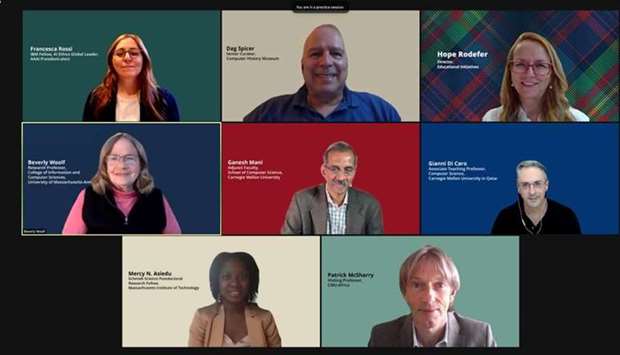An international panel discussion hosted by Carnegie Mellon University in Qatar (CMU-Q), a Qatar Foundation partner university, delved into the grand challenges of Artificial Intelligence (AI).
The session was moderated by Ganesh Mani, adjunct faculty at the School of Computer Science on CMU’s main campus, who is teaching a micro course at CMU-Q this semester.
“You may ask why grand challenges are important,” said Mani as he opened the session. “They can act as a North Star, guiding practitioners and young researchers. A good mantra is ‘of the people, by the people with machines, for the people'."
People from five continents tuned in to listen to the discussion.
During the webinar, the panel discussed the grand challenges for AI researchers in areas such as global health, education and robotics. Although each area has its own unique demands, the panel agreed that the overarching questions are how AI can enhance human intelligence, improve quality of life, and help tackle global issues like climate change and inequities in healthcare.
The panel included two professors from the global CMU community: Gianni Di Caro, associate teaching professor of computer science on the Qatar campus, and Patrick McSharry, visiting professor at CMU Africa in Rwanda.
Experts from academia and industry also joined the panel, including Mercy Asiedu, Schmidt Science postdoctoral research fellow, Massachusetts Institute of Technology; Francesca Rossi, IBM fellow, AI ethics global leader, AAAI president-elect; Dag Spicer, senior curator of the Computer History Museum; and Beverly Woolf, research professor, College of Information and Computer Sciences, University of Massachusetts-Amherst.
The panel was organised as part of Mani’s micro course on AI that students are taking on both the Qatar and Rwanda campuses.
Michael Trick, dean of CMU-Q, noted the role that micro courses play for the global Carnegie Mellon community. Taught by faculty on the main CMU campus in Pittsburgh, micro courses open new avenues of investigation and inquiry for students at CMU-Q.
“Micro courses are a window into some of the most pressing and relevant questions in the world today. I am so pleased that Carnegie Mellon students, the Qatar community, and people around the world could be part of this discussion on the humanitarian implications of AI.”
The full discussion is available on CMU-Q’s YouTube channel.
The session was moderated by Ganesh Mani, adjunct faculty at the School of Computer Science on CMU’s main campus, who is teaching a micro course at CMU-Q this semester.
“You may ask why grand challenges are important,” said Mani as he opened the session. “They can act as a North Star, guiding practitioners and young researchers. A good mantra is ‘of the people, by the people with machines, for the people'."
People from five continents tuned in to listen to the discussion.
During the webinar, the panel discussed the grand challenges for AI researchers in areas such as global health, education and robotics. Although each area has its own unique demands, the panel agreed that the overarching questions are how AI can enhance human intelligence, improve quality of life, and help tackle global issues like climate change and inequities in healthcare.
The panel included two professors from the global CMU community: Gianni Di Caro, associate teaching professor of computer science on the Qatar campus, and Patrick McSharry, visiting professor at CMU Africa in Rwanda.
Experts from academia and industry also joined the panel, including Mercy Asiedu, Schmidt Science postdoctoral research fellow, Massachusetts Institute of Technology; Francesca Rossi, IBM fellow, AI ethics global leader, AAAI president-elect; Dag Spicer, senior curator of the Computer History Museum; and Beverly Woolf, research professor, College of Information and Computer Sciences, University of Massachusetts-Amherst.
The panel was organised as part of Mani’s micro course on AI that students are taking on both the Qatar and Rwanda campuses.
Michael Trick, dean of CMU-Q, noted the role that micro courses play for the global Carnegie Mellon community. Taught by faculty on the main CMU campus in Pittsburgh, micro courses open new avenues of investigation and inquiry for students at CMU-Q.
“Micro courses are a window into some of the most pressing and relevant questions in the world today. I am so pleased that Carnegie Mellon students, the Qatar community, and people around the world could be part of this discussion on the humanitarian implications of AI.”
The full discussion is available on CMU-Q’s YouTube channel.

